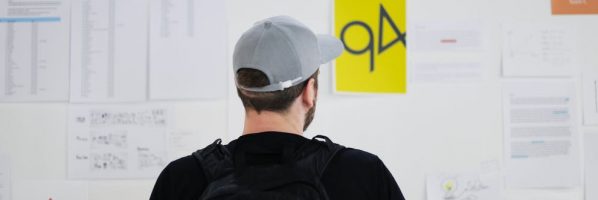Day-To-Day Creativity, and More – Chicago MBA News

Let’s explore some of the most interesting stories that have emerged from Chicago business schools this week.
Putting Creativity to Work – Chicago Booth Magazine
Chicago Booth recently published an article about how entrepreneurs and employees alike create opportunities for creative thinking.
Bay Area online video startup Darby Smart’s Nicole Farb (’09) suggests setting aside “open blocks of time for less structured thinking while brainstorming initial ideas.” She adds, “In my own life, creativity is a journey. I’m often doing it for the process, not the outcome.” She also advocates that part of embracing creativity is “failing fast.”
U.S. Postal Service Marketing and Client Relationship Manager Mauresa Pittman (’10) writes of the challenge involved in distilling the creative process to just a stamp. She writes, “The creative challenge became, how do we sum up one of the most prominent American artists of the 20th century in a pane of 12 stamps. [We also] need to consider how this message could land with different audiences and ask ourselves if we are being mindful of the diverse viewpoints.”
Ted Wright (’00), founder of Atlanta-based word-of-mouth marketing agency Fizz, believes creativity is the result of “data plus will.” He adds, “We start by asking a lot of questions about your company. For us, creativity starts with what the story is that you are trying to communicate to people.”
You can check out the full article here.
Business Students Learn the Meaning of ‘Moralogy’ During Summer Program in Japan – Mendoza Ideas & News
The Notre Dame University Mendoza Business and Culture in Japan course introduced “undergrads to Japan’s cultural and business traditions during four campus class sessions and two weeks on-site in Tokyo.”
Mendoza Associate Teaching Professor of Management & Organization and Liu Institute for Asia and Asian Studies faculty fellow Jessica McManus Warnell led the 17-member cohort on the trip to understand Japan’s “moralogical” approach to business, which “presents the idea that business can foster a virtue ethic that then makes business better for all stakeholders—customers and clients, employees, managers, and society.”
She writes, “What we were hearing from the companies we visited [in Japan] was that successful business is more about societal impact and employee engagement and customer satisfaction.”
You can read more from the article here.
What Will It Take to Get More Women on Boards? – Kellogg Insight
Northwestern Kellogg surveyed the gender gap that exists within many company boards—19.9 percent of S&P 500 company directors and 14.7 globally—and how to build more momentum to get more women to serve on boards.
The article’s first point involves the consideration of women who happen to be senior VPs or C-level positions other than CEO when companies want to add a female director. “Applying the same qualifying criteria to both male and female directors would increase the pool of executive women who bring talent, experience, and a diverse perspective to board service.”
The article notes that a major part of being considered as a board director involves “honing a value proposition,” which Kellogg’s Women’s Director Development Program has helped almost 800 women understand in order to be better prepared for board opportunities.
The article singles out a story from one high-level executive whose phone did not ring despite “vast experience, incredible skills, and a huge network.”
“When nothing happened, she realized she needed to reach out strategically to an even broader range of people to communicate the value she could bring to particular types of boards and seek their advice. She ultimately secured a seat not only on the board of one company she admired, but a number of others as well.”
Read the rest of the article here.
Columbia Researchers Develop New Tool to Uncover Better Ideas Faster

The power of algorithms, at times, seems ever reaching. So much in fact that two Columbia Business School professors have figured out how to formulate creativity out of one.
In a new research paper entitled Idea Generation, Creativity, and Prototypicality, CBS professors Olivier Toubia and Oded Netzer compared the development of this tool, which users can explore at protoideation.org, to the preparation of good food.
“Just like cooking, every idea that is generated can be considered a recipe with various ingredients. By modifying an idea’s ‘recipe’ and combining familiar words along with some novel words, one can create the perfect combination for a creative idea,” they said
Toubia and Netzer analyzed over 4,000 ideas and uncovered that a “well-balanced combination of familiarity and novelty” is what makes an idea creative. Their tool is ideal for “supporting idea generation, streamlining the screening process for new ideas, and helping businesses run more efficiently.
Professor Netzer explains, “Despite popular belief, creative ideas don’t just appear out of thin air; in many cases, they are the result of an arduous and lengthy process of idea generation. Our experiments proved that the online tool was successful not only in identifying promising ideas, but also in demonstrating the capability for improving ideas by proposing words – and combination of words—that may serve as ‘ingredients’ for ideas.”
You can read more about the study and the work of Toubia and Netser here.
Stanford Hosts Future of Work Symposium

The recent Stanford “Future of Work” symposium, co-presented by Stanford Career Education and OZY EDU, explored a number of topics related to a changing labor force in the face of automation, and what a more expansive definition of continuing education might entail.
Coursera CEO Jeff Maggioncalda SGSB ’96 and one of the panelists, believes that college degrees “will remain useful to build fundamental skills,” but that even college-educated members of the labor force “will be expected to continue their education throughout their careers” in order to stay competitive.
This is especially true for graduates with humanities and social science degrees, whose knowledge, according to Stanford’s Senior Vice Provost for Education Harry Elam, Jr. remain crucially important to helping industry “understand biases in data, facilitate collaboration, bring insight, provide historical perspective, and humanize technology in a data-driven world.”
GSV Asset Management co-founder Michael Moe believes that humanities and social science graduates can help us augment “the three R’s” with “the four C’s”: critical thinking, communication, creativity, and cultural fluency.
MindSumo co-founder and current Stanford GSB student Trent Hazy believes people with humanities and social science can “easily develop transferable skills that employers value. Humanities majors who also learn some quantitative skills by taking classes in statistics or logic will have an advantage over those who don’t.”
Coursera VP and Stanford GSB ’10 grad Julia Stiglitz believes startups like hers open up “educational opportunities … to anyone who has the will and desire and ability to go through it, and as a result I think we’re going to see all sorts of new people come into fields they otherwise wouldn’t have access to.”
When it comes to the projected 2030 obsolescence of half of today’s jobs by automation, all the speakers firmly believed that technology will create “new economic opportunity” in the long-term. Moe concludes: “While automation eats jobs, it doesn’t eat work.”
USD Business Professor Explains Millennial Creativity Problems

According to a recent study by IBM, the number one employee trait most desired by 1,500 executives is creativity. Unfortunately, the same survey revealed that more than 50 percent of executives struggle with recognizing and embracing creative solutions. According to Jennifer Mueller, an Associate Professor of Management at the University of San Diego School of Business Administration, the struggle with creativity isn’t a new or isolated problem. Continue reading…
Creativity Thrives on Idea of Scarcity, According to Carey School Research

A study co-authored by Johns Hopkins Carey Business School Assistant Professor Meng Zhu finds that when it comes to creativity, less can be more. The study was co-authored by Ravi Mehta from the University of Illinois Urbana-Champaign and published in the Journal of Consumer Research.
Judge Students Develop Digital Opportunities for Lloyds Banking Group

Lloyds Banking Group and Judge Business School recently undertook a unique collaboration to look at innovative digital opportunities for banks and banking customers, according to a press release from the school. As part of the Mphil in Management program offered at Judge, students took part in a six-week program to better their understand of three key areas identified by Lloyds: identity, social, and gamification. Continue reading…
